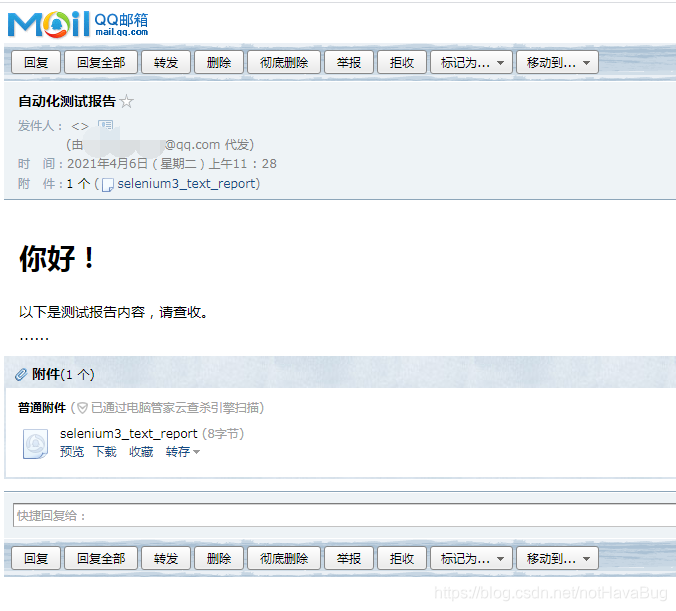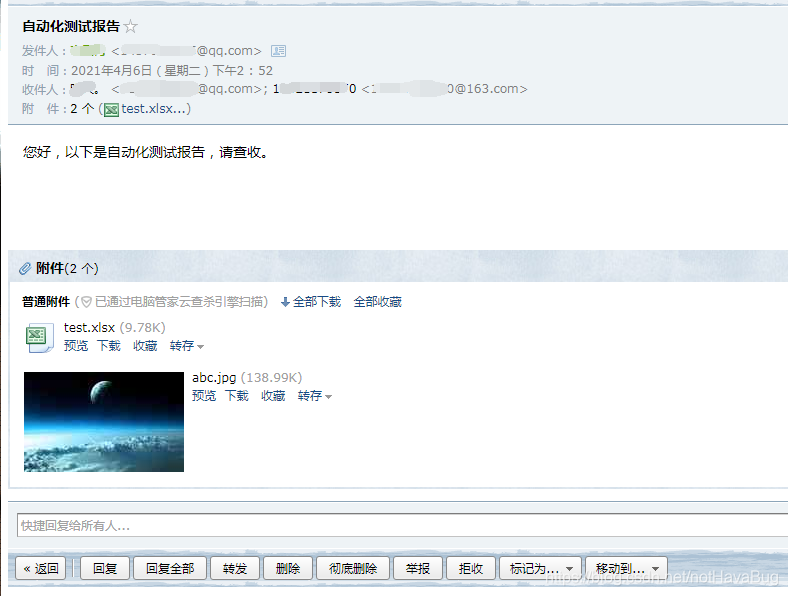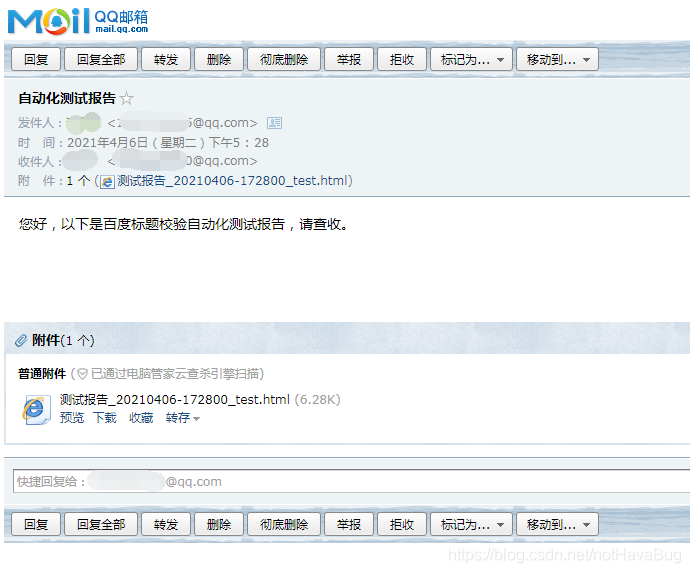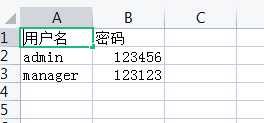python3+selenium3自动化测试 - 自动生成HTML测试报告并发送邮件
前言
提示:以下是本篇文章正文内容,小白个人研究成果,仅供参考
一、发送邮件 - 方式一(python自带)
我用的是QQ邮箱
获取授权码的方式:登录qq邮箱后,找到左上角的设置 - 选择账户 - POP3/IMAP/SMTP/Exchange/CardDAV/CalDAV服务 - IMAP/SMTP服务 (什么是 IMAP,它又是如何设置?) - 开启 - 完成验证后返回的就是授权码 具体参考 https://baijiahao.baidu.com/s?id=1552315463915496&wfr=spider&for=pc
#!/usr/bin/env python
# -*- coding:utf-8 -*-
import smtplib
from email.mime.text import MIMEText
from email.mime.multipart import MIMEMultipart
def setContext(filepath, filename, context, subject):# filepath : 文件路径 filename:文件名 context: 文件正文 subject:主题
# 添加附件
with open(filepath, 'rb') as f:
send_att = f.read()
# 设置附件
att = MIMEText(send_att, 'text', 'utf-8')
att['Content-Type'] = 'application/octet-stream'
att['Content-Disposition'] = r'attachment;filename=' + filename
# 设置html格式邮件正文
msgtext = MIMEText(context, 'html', 'utf-8')
# 采用related定义内嵌资源的邮件体
msg = MIMEMultipart('related')
msg['Subject'] = subject
msg.attach(att)
msg.attach(msgtext)
return msg
def send(msg, sender, recerive, code):# 邮件内容, 发送方,接收方,授权码
# 发送邮件
smtp = smtplib.SMTP()
# 发送邮件的服务器地址,例如qq邮箱(是smtp.qq.com而不是mail.qq.com哦)
smtp.connect('smtp.qq.com')
# 发送方登录 用户+授权码(非密码)
smtp.login(sender, code)
# 发送短信 发件方+收件方
smtp.sendmail(sender, recerive, msg.as_string())
smtp.quit()
if __name__ == '__main__':
filepath = r'E:\test\test.txt'
filename = 'selenium3_text_report'
context = '<html><h1>你好!</h1><span>以下是测试报告内容,请查收。<span><br/><span>......</span></html>'
subject = u'自动化测试报告'
msg = setContext(filepath, filename, context, subject)
sender = '1457126715@qq.com'
recerive = '2275389460@qq.com'
code = 'lxlzptgqkqxoifaa'
send(msg, sender, recerive, code)
收到的邮件如下:

pip3 install yagmail -i https://pypi.douban.com/simple
二、发送邮件 - 方式二(yagmail)
个人比较推荐第二种方式,实在是简洁多了,三行搞定!!!
首先导入包 cmd直接输入即可
pip3 install yagmail -i https://pypi.douban.com/simple
正文:
#!/usr/bin/env python
# -*- coding:utf-8 -*-
import yagmail
def send():
# 连接邮箱服务器 发送方邮箱+授权码+邮箱服务地址
yag = yagmail.SMTP(user='woshifasongfang@qq.com', password='woshishouquanma', host='smtp.qq.com')
# 邮件正文 支持html,支持上传附件(填写在任意位置皆可)
# 1. 上传附件
# content = ['尊敬的xxx:', '您好,以下是自动化测试报告,请查收。测试地址:<a href="https:www.baidu.com">百度</a>', r'E:\test\abc.jpg', '......']
# 2. 不上传附件
content = ['您好,以下是自动化测试报告,请查收。']
# 发送的几种方式 发送方+主题+内容
# 1. 单个用户不带附件
# yag.send('woshijieshoufang@qq.com', u'自动化测试报告', content)
# 2. 单个用户,添加附件
# yag.send('woshijieshoufang@qq.com', u'自动化测试报告', content, r'E:\test\abc.jpg')
# 3. 多个用户,多个附件
yag.send(['woshijieshoufang1@qq.com', 'woshijieshoufang2@163.com'], u'自动化测试报告', content, [r'E:\test\test.xlsx', r'E:\test\abc.jpg', r'E:\test\test.txt'])
yag.close()
if __name__ == '__main__':
send()
收到的邮件如下:

运行后有一个小问题,上传的附件是txt文件的话接收方是QQ邮箱没有收到附件,而我的163邮箱则可以收到,这个地方很奇怪但也没有找到解决方法,记录一下
三、实例 - 生成html文件并发送邮件
业务逻辑: 测试百度标题是否符合期待,并生成html测试报告发送邮件
下载并修改HTMLTestRunner.py
首先下载HTMLTestRunner.py(只能手动复制,下载地址:http://tungwaiyip.info/software/HTMLTestRunner.html 放到python/lib下),由于已经不支持python3所以需要做修改 (文末附上已经修改好的)
新建Test_Demo.py 写测试用例
注意 类的名称不可以是unittest.py否则会覆盖原有的unittest.py类导致TestCase失效
#!/usr/bin/env python
# -*- coding:utf-8 -*-
import time
import unittest
import csv
from selenium import webdriver
from itertools import islice
class TestDemo(unittest.TestCase):
# 初始化
def setUp(self):
print('开始执行')
# 打开谷歌浏览器
self.driver = webdriver.Chrome()
# 窗口最大化
self.driver.maximize_window()
# 请求百度地址
self.driver.get("https://www.baidu.com/")
# 隐性等待最长15秒
self.driver.implicitly_wait(15)
# 必须以test开头,否则unittest自动扫描不到,如果是suite.addTest(TestDemo('xxx'))执行测试用例则无所谓
def test_searchTitle(self):
"""百度标题校验"""
self.assertEqual(self.driver.title, "百度一下,你就知道")
time.sleep(1)
def test_isUpper(self):
"""判断单词是否大写"""
self.assertTrue("SELENIUM".isupper(), msg='错误:单词不是大写')
def test_readCsv(self):
"""自动读取csv文件"""
# 可用于多用户登录等,这里只做简单读取演示
try:
# 读取csv文件 (如果第一行的第一个字段多出”\ufeff“,请修改encoding="utf-8-sig")
with open(r'C:\Users\yzzn\Desktop\test.csv', 'r', encoding="utf-8") as f:
datas = csv.reader(f)
print(type(datas))
# 遍历并跳过首行 islice(数据,从第N行开始,到N行结束(最后一行用None))
for data in islice(datas, 1, None):
print("用户名:", data[0], "密码:", data[1])
except Exception as e:
print('读取文件异常!异常信息:', e)
# 被捕获的异常默认测试用例是通过的,raise可以抛出异常使测试用例不通过
raise e
# 销毁
def tearDown(self):
self.driver.quit()
print('执行结束')
"""
if __name__ == '__main__':
unittest.main()
"""
生成html及发送邮件
#!/usr/bin/env python
# -*- coding:utf-8 -*-
import time
import unittest
import yagmail
from HTMLTestRunner import HTMLTestRunner
from Test_Demo import TestDemo
if __name__ == '__main__':
suite = unittest.TestSuite()
# 执行测试用例
# 方案一:手动一个一个添加
# suite.addTest(TestDemo('test_searchTitle'))
# suite.addTest(TestDemo('test_readCsv'))
# 方案二:自动识别并执行所有测试用例 路径(./: 当前文件) + 要匹配的文件名
discover = unittest.defaultTestLoader.discover('./', pattern='Test_*.py')
# 获取当前时间作为文件名
now = time.strftime('%Y%m%d-%H%M%S')
filename = 'E://test/selenium_file/测试报告_' + now + '_test.html'
fp = open(filename, 'wb')
# 生成html文件
runner = HTMLTestRunner(
stream=fp,
verbosity=2,
title="百度标题校验",
description="测试报告的详情")
# runner.run(suite)
runner.run(discover)
fp.close()
# 发送邮件 中文标题记得加上encoding='GBK',小心乱码哦
# 发送方+授权码+邮箱服务器地址+编码处理
yag = yagmail.SMTP(user='1457126715@qq.com', password='lxlzptgqkqxoifaa', host='smtp.qq.com', encoding='GBK')
# 内容+附件
content = ['您好,以下是百度标题校验自动化测试报告,请查收。', filename]
# 发送
yag.send('2275389460@qq.com', u'自动化测试报告', content)
yag.close()
结果:


我的CSV文件内容如下:

修改好的HTMLTestRunner.py文件
"""
A TestRunner for use with the Python unit testing framework. It
generates a HTML report to show the result at a glance.
The simplest way to use this is to invoke its main method. E.g.
import unittest
import HTMLTestRunner
... define your tests ...
if __name__ == '__main__':
HTMLTestRunner.main()
For more customization options, instantiates a HTMLTestRunner object.
HTMLTestRunner is a counterpart to unittest's TextTestRunner. E.g.
# output to a file
fp = file('my_report.html', 'wb')
runner = HTMLTestRunner.HTMLTestRunner(
stream=fp,
title='My unit test',
description='This demonstrates the report output by HTMLTestRunner.'
)
# Use an external stylesheet.
# See the Template_mixin class for more customizable options
runner.STYLESHEET_TMPL = '<link rel="stylesheet" href="my_stylesheet.css" type="text/css">'
# run the test
runner.run(my_test_suite)
------------------------------------------------------------------------
Copyright (c) 2004-2007, Wai Yip Tung
All rights reserved.
Redistribution and use in source and binary forms, with or without
modification, are permitted provided that the following conditions are
met:
* Redistributions of source code must retain the above copyright notice,
this list of conditions and the following disclaimer.
* Redistributions in binary form must reproduce the above copyright
notice, this list of conditions and the following disclaimer in the
documentation and/or other materials provided with the distribution.
* Neither the name Wai Yip Tung nor the names of its contributors may be
used to endorse or promote products derived from this software without
specific prior written permission.
THIS SOFTWARE IS PROVIDED BY THE COPYRIGHT HOLDERS AND CONTRIBUTORS "AS
IS" AND ANY EXPRESS OR IMPLIED WARRANTIES, INCLUDING, BUT NOT LIMITED
TO, THE IMPLIED WARRANTIES OF MERCHANTABILITY AND FITNESS FOR A
PARTICULAR PURPOSE ARE DISCLAIMED. IN NO EVENT SHALL THE COPYRIGHT OWNER
OR CONTRIBUTORS BE LIABLE FOR ANY DIRECT, INDIRECT, INCIDENTAL, SPECIAL,
EXEMPLARY, OR CONSEQUENTIAL DAMAGES (INCLUDING, BUT NOT LIMITED TO,
PROCUREMENT OF SUBSTITUTE GOODS OR SERVICES; LOSS OF USE, DATA, OR
PROFITS; OR BUSINESS INTERRUPTION) HOWEVER CAUSED AND ON ANY THEORY OF
LIABILITY, WHETHER IN CONTRACT, STRICT LIABILITY, OR TORT (INCLUDING
NEGLIGENCE OR OTHERWISE) ARISING IN ANY WAY OUT OF THE USE OF THIS
SOFTWARE, EVEN IF ADVISED OF THE POSSIBILITY OF SUCH DAMAGE.
"""
# URL: http://tungwaiyip.info/software/HTMLTestRunner.html
__author__ = "Wai Yip Tung"
__version__ = "0.8.2"
"""
Change History
Version 0.8.2
* Show output inline instead of popup window (Viorel Lupu).
Version in 0.8.1
* Validated XHTML (Wolfgang Borgert).
* Added description of test classes and test cases.
Version in 0.8.0
* Define Template_mixin class for customization.
* Workaround a IE 6 bug that it does not treat <script> block as CDATA.
Version in 0.7.1
* Back port to Python 2.3 (Frank Horowitz).
* Fix missing scroll bars in detail log (Podi).
"""
# TODO: color stderr
# TODO: simplify javascript using ,ore than 1 class in the class attribute?
import datetime
import io
import sys
import time
import unittest
from xml.sax import saxutils
# ------------------------------------------------------------------------
# The redirectors below are used to capture output during testing. Output
# sent to sys.stdout and sys.stderr are automatically captured. However
# in some cases sys.stdout is already cached before HTMLTestRunner is
# invoked (e.g. calling logging.basicConfig). In order to capture those
# output, use the redirectors for the cached stream.
#
# e.g.
# >>> logging.basicConfig(stream=HTMLTestRunner.stdout_redirector)
# >>>
class OutputRedirector(object):
""" Wrapper to redirect stdout or stderr """
def __init__(self, fp):
self.fp = fp
def write(self, s):
self.fp.write(s)
def writelines(self, lines):
self.fp.writelines(lines)
def flush(self):
self.fp.flush()
stdout_redirector = OutputRedirector(sys.stdout)
stderr_redirector = OutputRedirector(sys.stderr)
# ----------------------------------------------------------------------
# Template
class Template_mixin(object):
"""
Define a HTML template for report customerization and generation.
Overall structure of an HTML report
HTML
+------------------------+
|<html> |
| <head> |
| |
| STYLESHEET |
| +----------------+ |
| | | |
| +----------------+ |
| |
| </head> |
| |
| <body> |
| |
| HEADING |
| +----------------+ |
| | | |
| +----------------+ |
| |
| REPORT |
| +----------------+ |
| | | |
| +----------------+ |
| |
| ENDING |
| +----------------+ |
| | | |
| +----------------+ |
| |
| </body> |
|</html> |
+------------------------+
"""
STATUS = {
0: 'pass',
1: 'fail',
2: 'error',
}
DEFAULT_TITLE = 'Unit Test Report'
DEFAULT_DESCRIPTION = ''
# ------------------------------------------------------------------------
# HTML Template
HTML_TMPL = r"""<?xml version="1.0" encoding="UTF-8"?>
<!DOCTYPE html PUBLIC "-//W3C//DTD XHTML 1.0 Strict//EN" "http://www.w3.org/TR/xhtml1/DTD/xhtml1-strict.dtd">
<html xmlns="http://www.w3.org/1999/xhtml">
<head>
<title>%(title)s</title>
<meta name="generator" content="%(generator)s"/>
<meta http-equiv="Content-Type" content="text/html; charset=UTF-8"/>
%(stylesheet)s
</head>
<body>
<script language="javascript" type="text/javascript"><!--
output_list = Array();
/* level - 0:Summary; 1:Failed; 2:All */
function showCase(level) {
trs = document.getElementsByTagName("tr");
for (var i = 0; i < trs.length; i++) {
tr = trs[i];
id = tr.id;
if (id.substr(0,2) == 'ft') {
if (level < 1) {
tr.className = 'hiddenRow';
}
else {
tr.className = '';
}
}
if (id.substr(0,2) == 'pt') {
if (level > 1) {
tr.className = '';
}
else {
tr.className = 'hiddenRow';
}
}
}
}
function showClassDetail(cid, count) {
var id_list = Array(count);
var toHide = 1;
for (var i = 0; i < count; i++) {
tid0 = 't' + cid.substr(1) + '.' + (i+1);
tid = 'f' + tid0;
tr = document.getElementById(tid);
if (!tr) {
tid = 'p' + tid0;
tr = document.getElementById(tid);
}
id_list[i] = tid;
if (tr.className) {
toHide = 0;
}
}
for (var i = 0; i < count; i++) {
tid = id_list[i];
if (toHide) {
document.getElementById('div_'+tid).style.display = 'none'
document.getElementById(tid).className = 'hiddenRow';
}
else {
document.getElementById(tid).className = '';
}
}
}
function showTestDetail(div_id){
var details_div = document.getElementById(div_id)
var displayState = details_div.style.display
// alert(displayState)
if (displayState != 'block' ) {
displayState = 'block'
details_div.style.display = 'block'
}
else {
details_div.style.display = 'none'
}
}
function html_escape(s) {
s = s.replace(/&/g,'&');
s = s.replace(/</g,'<');
s = s.replace(/>/g,'>');
return s;
}
/* obsoleted by detail in <div>
function showOutput(id, name) {
var w = window.open("", //url
name,
"resizable,scrollbars,status,width=800,height=450");
d = w.document;
d.write("<pre>");
d.write(html_escape(output_list[id]));
d.write("\n");
d.write("<a href='javascript:window.close()'>close</a>\n");
d.write("</pre>\n");
d.close();
}
*/
--></script>
%(heading)s
%(report)s
%(ending)s
</body>
</html>
"""
# variables: (title, generator, stylesheet, heading, report, ending)
# ------------------------------------------------------------------------
# Stylesheet
#
# alternatively use a <link> for external style sheet, e.g.
# <link rel="stylesheet" href="$url" type="text/css">
STYLESHEET_TMPL = """
<style type="text/css" media="screen">
body { font-family: verdana, arial, helvetica, sans-serif; font-size: 80%; }
table { font-size: 100%; }
pre { }
/* -- heading ---------------------------------------------------------------------- */
h1 {
font-size: 16pt;
color: gray;
}
.heading {
margin-top: 0ex;
margin-bottom: 1ex;
}
.heading .attribute {
margin-top: 1ex;
margin-bottom: 0;
}
.heading .description {
margin-top: 4ex;
margin-bottom: 6ex;
}
/* -- css div popup ------------------------------------------------------------------------ */
a.popup_link {
}
a.popup_link:hover {
color: red;
}
.popup_window {
display: none;
position: relative;
left: 0px;
top: 0px;
/*border: solid #627173 1px; */
padding: 10px;
background-color: #E6E6D6;
font-family: "Lucida Console", "Courier New", Courier, monospace;
text-align: left;
font-size: 8pt;
width: 500px;
}
}
/* -- report ------------------------------------------------------------------------ */
#show_detail_line {
margin-top: 3ex;
margin-bottom: 1ex;
}
#result_table {
width: 80%;
border-collapse: collapse;
border: 1px solid #777;
}
#header_row {
font-weight: bold;
color: white;
background-color: #777;
}
#result_table td {
border: 1px solid #777;
padding: 2px;
}
#total_row { font-weight: bold; }
.passClass { background-color: #6c6; }
.failClass { background-color: #c60; }
.errorClass { background-color: #c00; }
.passCase { color: #6c6; }
.failCase { color: #c60; font-weight: bold; }
.errorCase { color: #c00; font-weight: bold; }
.hiddenRow { display: none; }
.testcase { margin-left: 2em; }
/* -- ending ---------------------------------------------------------------------- */
#ending {
}
</style>
"""
# ------------------------------------------------------------------------
# Heading
#
HEADING_TMPL = """<div class='heading'>
<h1>%(title)s</h1>
%(parameters)s
<p class='description'>%(description)s</p>
</div>
""" # variables: (title, parameters, description)
HEADING_ATTRIBUTE_TMPL = """<p class='attribute'><strong>%(name)s:</strong> %(value)s</p>
""" # variables: (name, value)
# ------------------------------------------------------------------------
# Report
#
REPORT_TMPL = """
<p id='show_detail_line'>Show
<a href='javascript:showCase(0)'>Summary</a>
<a href='javascript:showCase(1)'>Failed</a>
<a href='javascript:showCase(2)'>All</a>
</p>
<table id='result_table'>
<colgroup>
<col align='left' />
<col align='right' />
<col align='right' />
<col align='right' />
<col align='right' />
<col align='right' />
</colgroup>
<tr id='header_row'>
<td>Test Group/Test case</td>
<td>Count</td>
<td>Pass</td>
<td>Fail</td>
<td>Error</td>
<td>View</td>
</tr>
%(test_list)s
<tr id='total_row'>
<td>Total</td>
<td>%(count)s</td>
<td>%(Pass)s</td>
<td>%(fail)s</td>
<td>%(error)s</td>
<td> </td>
</tr>
</table>
""" # variables: (test_list, count, Pass, fail, error)
REPORT_CLASS_TMPL = r"""
<tr class='%(style)s'>
<td>%(desc)s</td>
<td>%(count)s</td>
<td>%(Pass)s</td>
<td>%(fail)s</td>
<td>%(error)s</td>
<td><a href="javascript:showClassDetail('%(cid)s',%(count)s)">Detail</a></td>
</tr>
""" # variables: (style, desc, count, Pass, fail, error, cid)
REPORT_TEST_WITH_OUTPUT_TMPL = r"""
<tr id='%(tid)s' class='%(Class)s'>
<td class='%(style)s'><div class='testcase'>%(desc)s</div></td>
<td colspan='5' align='center'>
<!--css div popup start-->
<a class="popup_link" onfocus='this.blur();' href="javascript:showTestDetail('div_%(tid)s')" >
%(status)s</a>
<div id='div_%(tid)s' class="popup_window">
<div style='text-align: right; color:red;cursor:pointer'>
<a onfocus='this.blur();' onclick="document.getElementById('div_%(tid)s').style.display = 'none' " >
[x]</a>
</div>
<pre>
%(script)s
</pre>
</div>
<!--css div popup end-->
</td>
</tr>
""" # variables: (tid, Class, style, desc, status)
REPORT_TEST_NO_OUTPUT_TMPL = r"""
<tr id='%(tid)s' class='%(Class)s'>
<td class='%(style)s'><div class='testcase'>%(desc)s</div></td>
<td colspan='5' align='center'>%(status)s</td>
</tr>
""" # variables: (tid, Class, style, desc, status)
REPORT_TEST_OUTPUT_TMPL = r"""
%(id)s: %(output)s
""" # variables: (id, output)
# ------------------------------------------------------------------------
# ENDING
#
ENDING_TMPL = """<div id='ending'> </div>"""
# -------------------- The end of the Template class -------------------
TestResult = unittest.TestResult
class _TestResult(TestResult):
# note: _TestResult is a pure representation of results.
# It lacks the output and reporting ability compares to unittest._TextTestResult.
def __init__(self, verbosity=1):
TestResult.__init__(self)
self.stdout0 = None
self.stderr0 = None
self.success_count = 0
self.failure_count = 0
self.error_count = 0
self.verbosity = verbosity
# result is a list of result in 4 tuple
# (
# result code (0: success; 1: fail; 2: error),
# TestCase object,
# Test output (byte string),
# stack trace,
# )
self.result = []
def startTest(self, test):
TestResult.startTest(self, test)
# just one buffer for both stdout and stderr
self.outputBuffer = io.StringIO()
stdout_redirector.fp = self.outputBuffer
stderr_redirector.fp = self.outputBuffer
self.stdout0 = sys.stdout
self.stderr0 = sys.stderr
sys.stdout = stdout_redirector
sys.stderr = stderr_redirector
def complete_output(self):
"""
Disconnect output redirection and return buffer.
Safe to call multiple times.
"""
if self.stdout0:
sys.stdout = self.stdout0
sys.stderr = self.stderr0
self.stdout0 = None
self.stderr0 = None
return self.outputBuffer.getvalue()
def stopTest(self, test):
# Usually one of addSuccess, addError or addFailure would have been called.
# But there are some path in unittest that would bypass this.
# We must disconnect stdout in stopTest(), which is guaranteed to be called.
self.complete_output()
def addSuccess(self, test):
self.success_count += 1
TestResult.addSuccess(self, test)
output = self.complete_output()
self.result.append((0, test, output, ''))
if self.verbosity > 1:
sys.stderr.write('ok ')
sys.stderr.write(str(test))
sys.stderr.write('\n')
else:
sys.stderr.write('.')
def addError(self, test, err):
self.error_count += 1
TestResult.addError(self, test, err)
_, _exc_str = self.errors[-1]
output = self.complete_output()
self.result.append((2, test, output, _exc_str))
if self.verbosity > 1:
sys.stderr.write('E ')
sys.stderr.write(str(test))
sys.stderr.write('\n')
else:
sys.stderr.write('E')
def addFailure(self, test, err):
self.failure_count += 1
TestResult.addFailure(self, test, err)
_, _exc_str = self.failures[-1]
output = self.complete_output()
self.result.append((1, test, output, _exc_str))
if self.verbosity > 1:
sys.stderr.write('F ')
sys.stderr.write(str(test))
sys.stderr.write('\n')
else:
sys.stderr.write('F')
class HTMLTestRunner(Template_mixin):
"""
"""
def __init__(self, stream=sys.stdout, verbosity=1, title=None, description=None):
self.stream = stream
self.verbosity = verbosity
if title is None:
self.title = self.DEFAULT_TITLE
else:
self.title = title
if description is None:
self.description = self.DEFAULT_DESCRIPTION
else:
self.description = description
self.startTime = datetime.datetime.now()
def run(self, test):
"Run the given test case or test suite."
result = _TestResult(self.verbosity)
test(result)
self.stopTime = datetime.datetime.now()
self.generateReport(test, result)
print (sys.stderr, '\nTime Elapsed: %s' % (self.stopTime-self.startTime))
return result
def sortResult(self, result_list):
# unittest does not seems to run in any particular order.
# Here at least we want to group them together by class.
rmap = {}
classes = []
for n,t,o,e in result_list:
cls = t.__class__
if not cls in rmap:
rmap[cls] = []
classes.append(cls)
rmap[cls].append((n,t,o,e))
r = [(cls, rmap[cls]) for cls in classes]
return r
def getReportAttributes(self, result):
"""
Return report attributes as a list of (name, value).
Override this to add custom attributes.
"""
startTime = str(self.startTime)[:19]
duration = str(self.stopTime - self.startTime)
status = []
if result.success_count: status.append('Pass %s' % result.success_count)
if result.failure_count: status.append('Failure %s' % result.failure_count)
if result.error_count: status.append('Error %s' % result.error_count )
if status:
status = ' '.join(status)
else:
status = 'none'
return [
('Start Time', startTime),
('Duration', duration),
('Status', status),
]
def generateReport(self, test, result):
report_attrs = self.getReportAttributes(result)
generator = 'HTMLTestRunner %s' % __version__
stylesheet = self._generate_stylesheet()
heading = self._generate_heading(report_attrs)
report = self._generate_report(result)
ending = self._generate_ending()
output = self.HTML_TMPL % dict(
title = saxutils.escape(self.title),
generator = generator,
stylesheet = stylesheet,
heading = heading,
report = report,
ending = ending,
)
self.stream.write(output.encode('utf8'))
def _generate_stylesheet(self):
return self.STYLESHEET_TMPL
def _generate_heading(self, report_attrs):
a_lines = []
for name, value in report_attrs:
line = self.HEADING_ATTRIBUTE_TMPL % dict(
name = saxutils.escape(name),
value = saxutils.escape(value),
)
a_lines.append(line)
heading = self.HEADING_TMPL % dict(
title = saxutils.escape(self.title),
parameters = ''.join(a_lines),
description = saxutils.escape(self.description),
)
return heading
def _generate_report(self, result):
rows = []
sortedResult = self.sortResult(result.result)
for cid, (cls, cls_results) in enumerate(sortedResult):
# subtotal for a class
np = nf = ne = 0
for n,t,o,e in cls_results:
if n == 0: np += 1
elif n == 1: nf += 1
else: ne += 1
# format class description
if cls.__module__ == "__main__":
name = cls.__name__
else:
name = "%s.%s" % (cls.__module__, cls.__name__)
doc = cls.__doc__ and cls.__doc__.split("\n")[0] or ""
desc = doc and '%s: %s' % (name, doc) or name
row = self.REPORT_CLASS_TMPL % dict(
style = ne > 0 and 'errorClass' or nf > 0 and 'failClass' or 'passClass',
desc = desc,
count = np+nf+ne,
Pass = np,
fail = nf,
error = ne,
cid = 'c%s' % (cid+1),
)
rows.append(row)
for tid, (n,t,o,e) in enumerate(cls_results):
self._generate_report_test(rows, cid, tid, n, t, o, e)
report = self.REPORT_TMPL % dict(
test_list = ''.join(rows),
count = str(result.success_count+result.failure_count+result.error_count),
Pass = str(result.success_count),
fail = str(result.failure_count),
error = str(result.error_count),
)
return report
def _generate_report_test(self, rows, cid, tid, n, t, o, e):
# e.g. 'pt1.1', 'ft1.1', etc
has_output = bool(o or e)
tid = (n == 0 and 'p' or 'f') + 't%s.%s' % (cid+1,tid+1)
name = t.id().split('.')[-1]
doc = t.shortDescription() or ""
desc = doc and ('%s: %s' % (name, doc)) or name
tmpl = has_output and self.REPORT_TEST_WITH_OUTPUT_TMPL or self.REPORT_TEST_NO_OUTPUT_TMPL
# o and e should be byte string because they are collected from stdout and stderr?
if isinstance(o,str):
# TODO: some problem with 'string_escape': it escape \n and mess up formating
# uo = unicode(o.encode('string_escape'))
# uo = o.decode('latin-1')
uo = e
else:
uo = o
if isinstance(e,str):
# TODO: some problem with 'string_escape': it escape \n and mess up formating
# ue = unicode(e.encode('string_escape'))
# ue = e.decode('latin-1')
ue = e
else:
ue = e
script = self.REPORT_TEST_OUTPUT_TMPL % dict(
id = tid,
output = saxutils.escape(uo+ue),
)
row = tmpl % dict(
tid = tid,
Class = (n == 0 and 'hiddenRow' or 'none'),
style = n == 2 and 'errorCase' or (n == 1 and 'failCase' or 'none'),
desc = desc,
script = script,
status = self.STATUS[n],
)
rows.append(row)
if not has_output:
return
def _generate_ending(self):
return self.ENDING_TMPL
##############################################################################
# Facilities for running tests from the command line
##############################################################################
# Note: Reuse unittest.TestProgram to launch test. In the future we may
# build our own launcher to support more specific command line
# parameters like test title, CSS, etc.
class TestProgram(unittest.TestProgram):
"""
A variation of the unittest.TestProgram. Please refer to the base
class for command line parameters.
"""
def runTests(self):
# Pick HTMLTestRunner as the default test runner.
# base class's testRunner parameter is not useful because it means
# we have to instantiate HTMLTestRunner before we know self.verbosity.
if self.testRunner is None:
self.testRunner = HTMLTestRunner(verbosity=self.verbosity)
unittest.TestProgram.runTests(self)
main = TestProgram
##############################################################################
# Executing this module from the command line
##############################################################################
if __name__ == "__main__":
main(module=None)
总结
小白学习,欢迎指导





 本文介绍了如何使用Python3和Selenium3进行自动化测试,并结合HTMLTestRunner生成详细的测试报告。文章详细展示了如何配置SMTP发送邮件,包括两种发送邮件的方法,并给出了实例代码。此外,还展示了如何将测试报告以HTML格式附加到邮件中,发送给指定的接收者。
本文介绍了如何使用Python3和Selenium3进行自动化测试,并结合HTMLTestRunner生成详细的测试报告。文章详细展示了如何配置SMTP发送邮件,包括两种发送邮件的方法,并给出了实例代码。此外,还展示了如何将测试报告以HTML格式附加到邮件中,发送给指定的接收者。
















 870
870

 被折叠的 条评论
为什么被折叠?
被折叠的 条评论
为什么被折叠?








